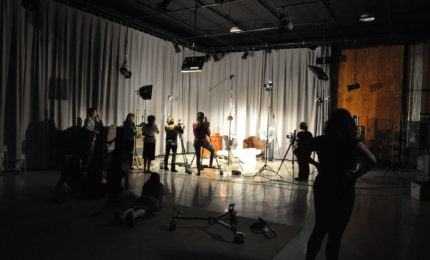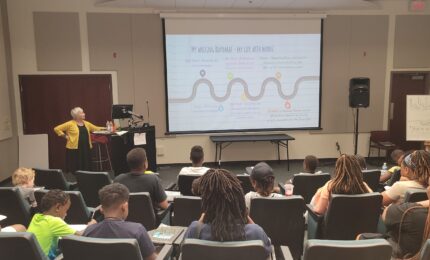Production Jobs Deep Dive: Production Office
By Grace Smith | May 2, 2024
The Production Office is the central nervous system of any production. It is the information hub that handles all logistics of making a film or TV Show. Everything from printing signs for crew parking areas to cast and crew start paperwork, to coordinating with vendors is conducted within the production office. We caught up with a few production office alums to tell us more about what their experience has been like.

Dianna Wilson, who has worked her way up from being a PA to a Production Coordinator, broke down the roles in the production office for us.
Producer – The producer is responsible for the whole production. Their job is to approve the budget and help keep the project within the budget. They hire the Line Producer and the Unit Production Manager and help with hiring of the department heads.
Line Producer – The Line Producer helps oversee the production and their main job is to keep the project on budget and on time. They also help hire department heads.
Unit Production Manager/Production Supervisor – (UPM is Union and Prod Sup is Non-union) They are responsible for overseeing the department heads and help the project stay on track. Watching that department heads are staying within their department budgets with man hours and equipment.
Production Coordinator (PC) – They Coordinate with the department heads and the Producers making sure that everyone has the information they need on a daily basis. They also coordinate with the department heads for renting and returning equipment. Taking care of the PO’s (Purchase Orders) and making sure things get picked up and returned on time.
Asst Prod Coordinator (APC) – Responsible for distribution of information and coordinating with the AD team, UPM, Line Prod, and PC for the Prelim and Call Sheet distribution. They coordinate the office PA’s schedule and when and what they are responsible for. They also take care of the Day Files and keep the records for the run of the production.
Production Secretary – The Non-Union version of an APC. Though some productions will have both an APC and Prod Sec. If that is the case, then the Prod Sec has less responsibility than the APC but more responsibility than the PA’s. Usually taking care of the office PA’s scheduling and some of the day-to-day filing.
Office Production Assistants – they do the daily runs and help with the daily paperwork during the run of the production. They often do Coffee Runs also. but seriously the PA’s have a lot of responsibility and are a key part of the production team.

Wilson, as well as Michael Kinney who has also worked in many roles in the Production Office, both pointed out that while these are many of the possible roles in the office, on smaller film sets, these roles may be combined.
“On a typical indie, you might have just one assistant coordinator, two office PAs, etc. But on a major studio show, those same roles could have teams of two coordinators, four or more PAs, and so on. The larger the budget, the more bodies are required,” Kinney said.
Harleigh Hildebrand, who works mostly as an Assistant Director, but who also has a lot of experience in the production office, also told us that the physical workspace for the Production Office can vary widely based on the size of production.
“Most small-budget projects I have been on didn’t even have a dedicated production office. We either had a trailer, a room on location or simply worked from home. Projects with bigger budgets usually have a dedicated office space,” Hildebrand said. “I think there are benefits of both styles. Whenever I get to work close to the set, it’s easier for me to quickly address the needs of crew members and departments. Some locations don’t have the best access to the internet or power, which makes working from there as a production coordinator difficult. Working in a dedicated office building allows for consistent access to the internet, and ease of collaboration between other production office staff, but can feel more distant from the needs of the set. I’m always a quick phone call, text, or email away though!”

In addition to the crew structure and physical office variations, another big difference between working on indie projects vs studio projects is the workflow, as Wilson pointed out.
“When I work on the bigger budget projects that have a studio backing them there is a safety net,” Wilson said. “They have a way that they do things and you actually get a book that tells you how they like things done. There is a procedure, and you follow that. Lower budget indie films don’t have that, and each one can be drastically different. I take my skills and the procedures I’ve learned from working on studio projects and apply them to the indie film project. It usually goes well. “
Wilson, Kinney, and Hildebrand all had advice to offer up and coming filmmakers interested in working in the production office.
“Being in the production office can be just as intense as it is on set,” Wilson said. “You get to learn the grit of productions in the office. You see how the AD’s and the Producers and Showrunner (if it’s episodic), work with the Director and the Director of Photography to bring the tone and vision of the project to fruition. It’s pretty magical to see that. You see all the equipment and stuff it takes to put it all together that you don’t get to witness on set because once they are on set, they have to be ready to go.”
“My advice for anyone aspiring to work in this industry is the same regardless of what specific role or department you want: be prepared to work twice as hard and for twice as long as your friends in more conventional career paths. The hours can be brutally long and the workload incredibly grueling at times. But if you have a true passion for film/TV and dedicate yourself fully, it’s an incredibly rewarding career unlike any other.” Kinney said. “Networking and developing connections are other vital keys to sustaining a career in this industry that so heavily relies on personal recommendations and word-of-mouth. You never know who might help open a door for your next gig, so get to know as many people as possible across all departments and roles.”
“I think anybody working in the production office should spend some time on jobs on set,” Hildebrand said. “It’s a good idea to get familiar with the processes of filming and see what kind of needs each department has. I recommend having good time-management, organizational skills, communication skills, being computer-savvy, and knowing everything you need to know about a printer. Seriously, the printers always cause the most trouble. Working as an office PA will help you gain insight into the flow of the production office and the ins and outs of all the tasks needed to help the production go smoothly.”



